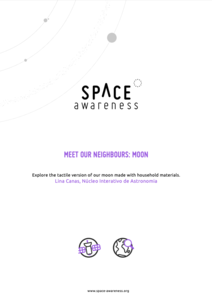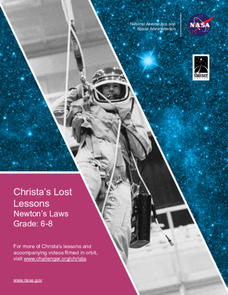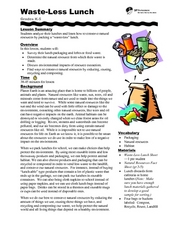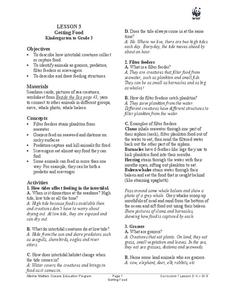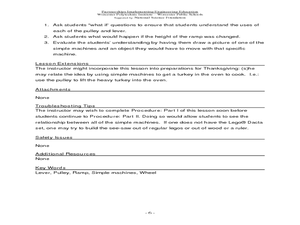Space Awareness
Meet Our Neighbors: Moon
Since a field trip to the moon isn't possible, bring the moon to young astronomers! Participants use everyday materials to create models of the moon and represent the features on its surface. The materials serve as a tactile as well as a...
Biology Junction
Biochemistry of Cells
Chemistry and biology work hand in hand, without one you literally wouldn't have the other. Using a presentation, individuals learn about plant cells, animal cells, cell responses, macromolecules, DNA bases, and so much more. A worksheet...
NASA
Christa's Lost Lesson: Newton’s Laws
How do the laws of motion work in space? Learners explore Newton's laws of motion in different experiments as part of the Christa's Lost Lessons series. They rotate around the room in three stations to experience each law in action using...
SF Environment
Waste-Less Lunch
Is it possible to have a waste-less lunch? Can your class become leaders in conservation? Discuss the importance of reducing waste during lunch time with a fun instructional activity that can be extended to everyday practices. First the...
Howard Hughes Medical Institute
Alzheimer’s Disease: Piecing Together the Evidence
5.7 million Americans live with Alzheimer's disease. With limited funding for research, where should scientists focus? Young scientists learn about current research and create their own questions. They then decide the best areas to focus...
Physics Classroom
Charge and Charging
Does your class understand how things become charged? Are you positive? Before negative grades emerge, assign a fun interactive! The first in the five-part Static Electricity series contains three levels of charge-related questions and...
National Library of Medicine
Your Environment, Your Health: Food Safety
Did youknow that chicken causes the greatest risk of food-borne illness. The fourth unit in a six-part series addresses food safety. Scholars research common scenarios of food causing illness through the National Institute for Health....
Curated OER
Agriculture in Your Life
Students explore the origins of food and other everyday products around the United States. In this agricultural lesson, students learn basic vocabulary and practice matching common items with their agricultural source. They categorize...
Curated OER
Hidden Science in Colonial Living
Fifth graders evaluate evidence that indicates a physical change has occurred. In this colonial living lesson, 5th graders explore the science involved in the making of items used in colonial life, such as, bread, butter, soap, candles,...
Curated OER
Getting Food
Learners complete activities to learn about the ocean food web. In this ocean life lesson plan, students discuss how the tides affect feeding, learn about filter feeders, grazers, predators, and scavengers. Learners then group the...
Curated OER
Come Shine with Us: Floor Polish Testing and Industrial Science To Teach Critical Thinking
Pupils discover that science relates to everyday life and see testing procedures used in an industrial laboratory. Students compare various brands of household and industrial floor polishes for specific criteria.
Curated OER
Characteristics of Materials
Students examine everyday materials by utilizing educational software. In this group analysis instructional activity, students identify several different fabrics and materials used in everyday life. Students participate in a computer...
Curated OER
The Water Cycle
Students identify the various ways water move throughout the earth as part of the water cycle. In this science lesson, students gain a knowledge of basic science concepts related to everyday life through patterns and how they repeat as...
Virginia Department of Education
Macromolecules
Finally, a chance for the class to play with their food! Allow pupils to simulate stomach acid with common foods, and introduce specific macromolecules into the mixture to explore characteristics of carbohydrates, lipids,...
Baylor College
Need or Want?
Even as adults it can be hard to distinguish needs from wants. Using pictures of common, everyday items, children make a pocket chart separating the objects they need from those that they want. Discuss their choices, explaining that...
Curated OER
Identify and use Simple Machines
Students are exposed to simple machines and their uses. In this everyday tools lesson, students watch a demonstration on how a lever, pulley, ramp, and wheel works. Students are given the opportunity to use hands-on techniques to explore...
Curated OER
Science Unit Lesson Five
Sixth graders review how and which plants operate in terrariums. In groups, they follow instructions to make their own terrarium and place different types of plants in it. To end the activity, they review the steps in the water cycle and...
Curated OER
A Multimedia Presentation to Describe Newton's Laws of Motion
Eighth graders use various sources to find pictorial evidence of Newton's laws of motion in everyday life. They use various sources of technology to import those pictures into a multimedia presentations.
Curated OER
Problem-Solving Math 1
Learners discuss the different ways we use numbers in everyday life. They walk around the classroom for 5 to 10 minutes, students are asked to point out examples of numbers they find in the room. Learners are asked to image a world...
TryEngineering
Pulleys and Force
Students investigate pulleys and pulley systems. They demonstrate how multiple pulleys dramatically reduce required force. They study hoe pulley systems are used in machines and impact everyday life.
Curated OER
Phases of Matter
Eighth graders practice using correct vocabulary and apply content knowledge related to phases of matter when answering questions about situations or observations from everyday life.
Curated OER
Classification in Action
Students work with a set of objects to set up both quantitative and qualitative classification systems. As a group, students follow an example to design and complete two classification systems using a set of objects provided. ...
Curated OER
W Is for Water
Third graders gain appreciation of water by watching online video, "Weather Smart: The Water Cycle and Clouds," exploring how water cycle works, comparing and contrasting three states of water as solid, liquid, and gas, and discussing...
Curated OER
The Greening of Mars: The Changes Necessary to Sustain Life on Mars
Fifth graders discuss the currents conditions on the planet of Mars. In groups, they work together to develop a mechanism that allows for a balanced ecosystem to survive on the planet. After presenting their ideas to the class, they...
